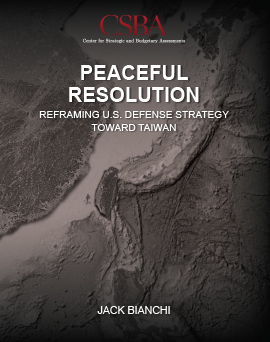
America’s strategic approach to Taiwan is ripe for reevaluation. Although Washington’s sensitivity to Taipei’s security dilemma has increased markedly in recent years, U.S. policy toward Taiwan remains bound by a series of outdated historical understandings. As a result, American policymakers have focused narrowly on arms sales to the island, rather than developing and articulating a new vision for United States-Taiwan security cooperation.
In Peaceful Resolution, CSBA Fellow Jack Bianchi argues that the United States has maintained an interest in peace across the Taiwan Strait since the early 1950s. This interest should remain the basis of U.S. policy toward Taiwan. American policymakers, therefore, should clearly and explicitly reframe U.S. policy not only to ensure continuity with enduring American interests, but also to catalyze new operational-level military efforts that could enhance stability in the Taiwan Strait.
The outcome of a future cross-strait conflict is likely contingent on American military intervention. Yet if war broke out today, U.S. and Taiwanese forces would be engaging in the military equivalent of parallel play—enacting their own independent plans and operations to defeat Chinese forces. To strengthen deterrence and increase the odds of successfully defending Taiwan, Washington and Taipei should aim for greater operational-level coordination via heightened interoperability, combined exercises, and an operationally relevant U.S. military presence on the island.



























